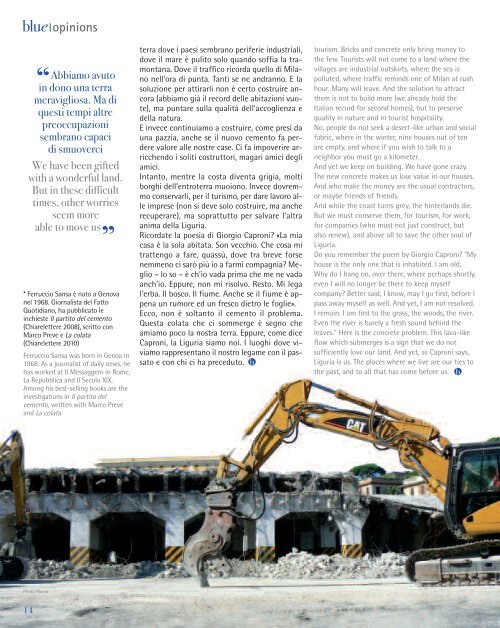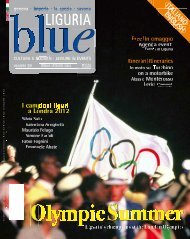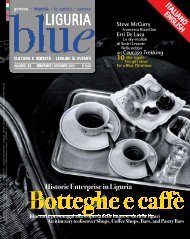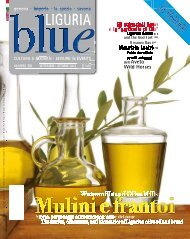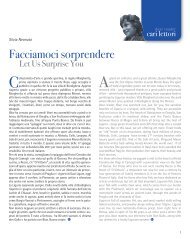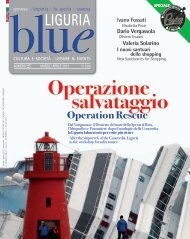cover - Blue Liguria - Sagep
cover - Blue Liguria - Sagep
cover - Blue Liguria - Sagep
Create successful ePaper yourself
Turn your PDF publications into a flip-book with our unique Google optimized e-Paper software.
lue<br />
Photo Macor<br />
14<br />
opinions<br />
“ Abbiamo avuto<br />
in dono una terra<br />
meravigliosa. Ma di<br />
questi tempi altre<br />
preoccupazioni<br />
sembrano capaci<br />
di smuoverci<br />
We have been gifted<br />
with a wonderful land.<br />
But in these difficult<br />
times, other worries<br />
seem more<br />
able to move us<br />
”<br />
* Ferruccio Sansa è nato a Genova<br />
nel 1968. Giornalista del Fatto<br />
Quotidiano, ha pubblicato le<br />
inchieste Il partito del cemento<br />
(Chiarelettere 2008), scritto con<br />
Marco Preve e La colata<br />
(Chiarelettere 2010)<br />
Ferruccio Sansa was born in Genoa in<br />
1968. As a journalist of daily news, he<br />
has worked at Il Messaggero in Rome,<br />
La Repubblica and Il Secolo XIX.<br />
Among his best-selling books are the<br />
investigations in Il partito del<br />
cemento, written with Marco Preve<br />
and La colata<br />
terra dove i paesi sembrano periferie industriali,<br />
dove il mare è pulito solo quando soffia la tramontana.<br />
Dove il traffico ricorda quello di Milano<br />
nell’ora di punta. Tanti se ne andranno. E la<br />
soluzione per attirarli non è certo costruire ancora<br />
(abbiamo già il record delle abitazioni vuote),<br />
ma puntare sulla qualità dell’accoglienza e<br />
della natura.<br />
E invece continuiamo a costruire, come presi da<br />
una pazzia, anche se il nuovo cemento fa perdere<br />
valore alle nostre case. Ci fa impoverire arricchendo<br />
i soliti costruttori, magari amici degli<br />
amici.<br />
Intanto, mentre la costa diventa grigia, molti<br />
borghi dell’entroterra muoiono. Invece dovremmo<br />
conservarli, per il turismo, per dare lavoro alle<br />
imprese (non si deve solo costruire, ma anche<br />
recuperare), ma soprattutto per salvare l’altra<br />
anima della <strong>Liguria</strong>.<br />
Ricordate la poesia di Giorgio Caproni? «La mia<br />
casa è la sola abitata. Son vecchio. Che cosa mi<br />
trattengo a fare, quassù, dove tra breve forse<br />
nemmeno ci sarò più io a farmi compagnia? Meglio<br />
– lo so – è ch’io vada prima che me ne vada<br />
anch’io. Eppure, non mi risolvo. Resto. Mi lega<br />
l’erba. Il bosco. Il fiume. Anche se il fiume è appena<br />
un rumore ed un fresco dietro le foglie».<br />
Ecco, non è soltanto il cemento il problema.<br />
Questa colata che ci sommerge è segno che<br />
amiamo poco la nostra terra. Eppure, come dice<br />
Caproni, la <strong>Liguria</strong> siamo noi. I luoghi dove viviamo<br />
rappresentano il nostro legame con il passato<br />
e con chi ci ha preceduto.<br />
tourism. Bricks and concrete only bring money to<br />
the few. Tourists will not come to a land where the<br />
villages are industrial outskirts, where the sea is<br />
polluted, where traffic reminds one of Milan at rush<br />
hour. Many will leave. And the solution to attract<br />
them is not to build more (we already hold the<br />
Italian record for second homes), but to preserve<br />
quality in nature and in tourist hospitality.<br />
No, people do not seek a desert-like urban and social<br />
fabric, where in the winter, nine houses out of ten<br />
are empty, and where if you wish to talk to a<br />
neighbor you must go a kilometer.<br />
And yet we keep on building. We have gone crazy.<br />
The new concrete makes us lose value in our houses.<br />
And who make the money are the usual contractors,<br />
or maybe friends of friends.<br />
And while the coast turns grey, the hinterlands die.<br />
But we must conserve them, for tourism, for work,<br />
for companies (who must not just construct, but<br />
also renew), and above all to save the other soul of<br />
<strong>Liguria</strong>.<br />
Do you remember the poem by Giorgio Caproni? “My<br />
house is the only one that is inhabited. I am old.<br />
Why do I hang on, over there, where perhaps shortly,<br />
even I will no longer be there to keep myself<br />
company? Better said, I know, may I go first, before I<br />
pass away myself as well. And yet, I am not resolved.<br />
I remain. I am tied to the grass, the woods, the river.<br />
Even the river is barely a fresh sound behind the<br />
leaves.” Here is the concrete problem. This lava-like<br />
flow which submerges is a sign that we do not<br />
sufficiently love our land. And yet, as Caproni says,<br />
<strong>Liguria</strong> is us. The places where we live are our ties to<br />
the past, and to all that has come before us.


